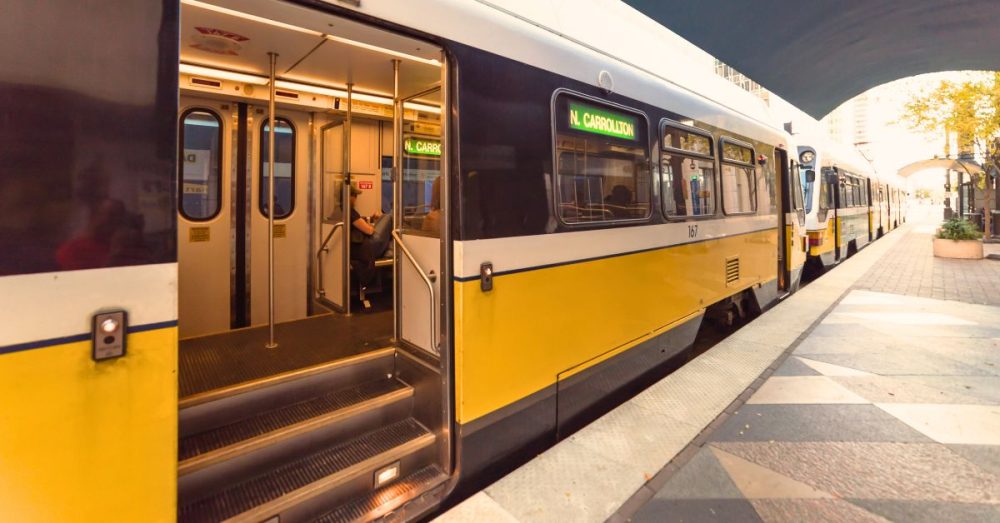Farmers Branch and Carrollton have become the latest member cities to approve resolutions supporting the reduction of sales-tax contributions to Dallas Area Rapid Transit.
“The City of Farmers Branch is not dropping out of DART,” Mayor Terry Lynne said during a council meeting this week.
“We are not eliminating DART service, so I want to make sure everyone understands that. There’s been an effort by many of the member cities to reduce their one-cent sales-tax contribution to DART, which has been in place since Day 1. … I choose to look at this as more of a realignment of participation,” Lynne said.
The Dallas Express reported in June that the Plano City Council unanimously approved a resolution calling for a sales-tax contribution reduction of 25%. It also “supports capping sales and use tax revenues at the amount equivalent to 2024 collections until a reduction can occur.”
Plano voters still have to approve the reduction in funding.
During the council meeting on Monday, Lynne took exception to a letter from DART asserting that the agency would reduce services and provide less security if Farmers Branch was successful in its bid to cut its contributions.
“We need to evaluate this contribution that we’ve been making over the past 40 years,” he said. “We were an original member city. If anything, DART needs to take a look at how they’re managing themselves because it’s our money. They’re using our money to compete against our own police department’s hiring efforts.”
Lynne called DART’s operations “an unsustainable model,” and Council Member Richard Jackson appeared disgusted over the agency’s approach.
“Regardless of my personal experiences riding DART, the impact I’ve seen on our city from DART is vagrancy, trash, crime,” he said.
Dallas has been suffering from similar issues. Polling has suggested that more than three-fourths of Dallas residents are dissatisfied with the state of vagrancy and panhandling in the city. Respondents also indicated their support for a “one-stop-shop” model of homeless services like in downtown San Antonio, where Haven for Hope has reportedly reduced unsheltered homelessness.
Jackson went on to say that such an impact was “threatening the safety of our neighborhoods we’re trying to build, like Mustang Station. … So I’ll echo your comments, mayor. To tell us that this cut will result in less policing or more unsafe or reduced services, I find [that] offensive. Our city has been paying half its sales tax for 40 years … and they can’t seem to police this parking lot out here?”
He also implied that DART riders threaten the safety of some residents in Farmers Branch.
“We’ve got residents in pretty high-dollar townhomes right here in front of this beautiful little rose garden area. There’s nothing but a chain-linked fence between them and all the trash that comes up here on the trains. So, I do take exception to the threat that could get worse if we cut the funding,” he said.
Farmers Branch council members approved the resolution in a 5-0 vote. If approved by voters, the reduction would save taxpayers a projected $5-6 million annually. See the full presentation here.
On the same day, Carrollton City Council members unanimously approved a similar resolution calling for a 25% reduction in its sales-tax contributions to DART.
Five days earlier, the Irving City Council did the same, and the Rowlett City Council unanimously approved a resolution supporting reducing its contributions by 25% as well.
As DART member cities, Farmers Branch, Plano, Irving, Carrollton, Dallas, Addison, Cockrell Hill, Garland, Richardson, Rowlett, Glenn Heights, University Park, and Highland Park direct a 1-cent sales-tax contribution to DART that accounts for roughly 75% of the entity’s $1.8 billion budget.
The University Park City Council was scheduled to consider a resolution to reduce its sales-tax contributions to DART, but that has been delayed.
Council members “voted to postpone it to a later meeting,” University Park spokesperson Abby Mancini said in an email. “They discussed waiting until the completion of DART’s value study with Ernst & Young before adding the item back on an agenda.”
DART CEO Nadine Lee has warned that losing a quarter of the sales-tax revenue it receives from Dallas would ruin the agency’s operations. But CFO Jack Ireland has recommended doing exactly that as part of the City’s effort to reconcile a $40 million budget shortfall and fully fund the Dallas Police and Fire Pension System.
“We anticipate DART would also have to substantially curtail demand response services that overlap fixed-route service, impacting large parts of the South Dallas, West Dallas, Inland Port, and Legacy West (Plano) zones, as well as portions of many others,” Lee wrote.
Earlier this month, DART board members approved an updated strategic plan to guide the agency for the next 10 years, The Dallas Express reported.


